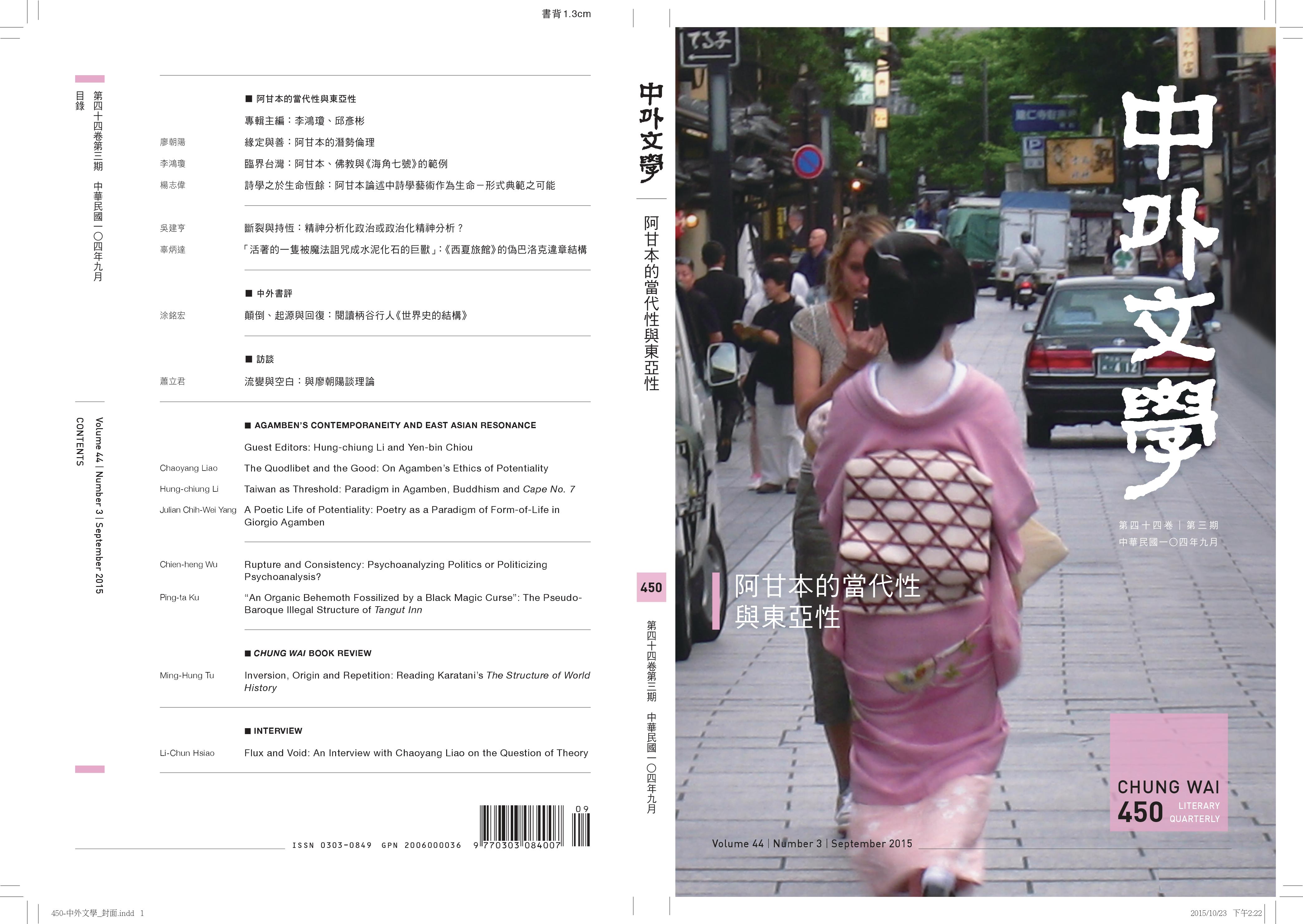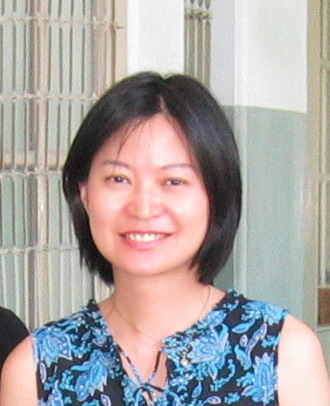第四十四卷 第三期 總450 中華民國104年9月
Vol.44 No.3 September 2015

《中外文學》九月號推出「阿甘本的當代性與東亞性」專輯,收錄了三篇精彩的專輯論文。廖朝陽探討緣定在與愛的關係,主張阿甘本(Giorgio Agamben)的潛勢並非單純取消善惡區分的框架,而需透過媒材性來「提供場所」,成立充分肯認潛正確的倫理觀,並指出只有「運動中」的善才不會拘束緣定在;李鴻瓊以魏德聖的電影《海角七號》為出發點,企圖將族群共在關係與臺灣客位本體扣連在一起,並以阿甘本的理論探討相關臺灣議題;楊志偉則討論阿甘本論述中,詩學藝術如何作為生命-形式之典範,指引生命的「恆餘」對抗主權「暴力」之可能。本期除了專輯論文,也刊登兩篇非專輯論文、一篇學術書評、以及一篇訪談。吳建亨探索紀傑克(Slavoj Žižek)早期對巴迪烏(Alain Badiou)的批判,並經由兩人對主體看法的歧異,闡釋精神分析與政治的關係所產出之不同的政治與倫理意涵;辜炳達則將駱以軍的小說《西夏旅館》置於臺灣的歷史脈絡上,探究其偽巴洛克式的違章結構。學術書評部分,涂銘宏對柄谷行人的著作《世界史的結構》做出精彩評析。訪談部分,則由本刊總編輯蕭立君與廖朝陽深入討論理論在臺灣之發展軌跡、挑戰、與可能性。
中外文學九月號目錄
Contents
弁言
Introduction
- 李鴻瓊、邱彥彬(專輯主編)╱弁言
Hung-chiung Li and Yen-bin Chiou, Guest Editors╱Introduction
廖朝陽╱緣定與善:阿甘本的潛勢倫理
緣定與善
阿甘本的潛勢倫理
廖朝陽*
摘要
阿甘本在《到來中共群》的開頭指出:緣定在的原意不是「不管什麼都一樣」而是「不論如何都不可忽視」。「不可忽視」不只是因為一次項保有獨一無二的內容,也是因為內容脫離交換而使價值潛勢純粹化、媒材化。理想共群是「到來中」共群而不是「未來」共群,正是因為潛勢不僅是潛態而是潛態的施力,所以可以實現的共群應該是由某處來,要到某處去的「運動」中共群。也就是說,潛勢雖然是潛在動勢,卻自己「會動」,涉及生存欲望導引下個體內部出現的共同性表達,並不是單純的虛擬。有表達就有給予、接受的關係,但是表達往往會被具體情境裡的個別性條件阻斷而體觸化,懸置在媒材性中而「潛入」動勢。
本文從幾個方面檢討、澄清在表達阻斷中形成的緣定在為什麼與愛有關,又為什麼在生存欲望高度偏向自動裝置的格局下仍然保有對抗的力量,能防止潛勢世界的自動裝置暴力化而落入無所不為。透過阿甘本對德勒茲電影理論的挑戰,我們可以將體觸、純粹手段或媒材性等觀念帶入自動裝置的討論,透過運動的物質性以及政治性來修正德勒茲貶抑運動的傾向。依循緣定在與愛的關係,我們可以看到阿甘本的潛勢並不是單純的取消善惡區分的正確性框架,而是要要透過媒材性來「提供場所」,成立充分肯認潛正確的倫理觀。
除了指出緣定在的媒材性與拉康的「一線」、「信標」等觀念有其互相呼應之處,本文也進一步以機器人工學的「恐怖谷」假說為例,說明其中的緣定在可以由「侘寂」美學的角度來解釋,已經超出佛洛伊德陌異感理論的處理範圍。在潛勢倫理的思維下,善可以不必當成目的地或有待征服的高峰,機器人也就不必追求成為「正確的人類」,因為不正確早已是個體不斷到達正確的一種方式,也只有「運動中」的善才不會固定化而拘束緣定在。
◎關鍵詞:阿甘本,德勒茲,拉康,班雅民,緣定在,運動,體觸,潛勢倫理
★國立臺灣大學外國語文學系特聘教授。
Chaoyang Liao╱The Quodlibet and the Good On Agamben’s Ethics of Potentiality
The Quodlibet and the Good
On Agamben’s Ethics of Potentiality
Chaoyang Liao*
Abstract
At the beginning of The Coming Community, Agamben points out that quodlibet ens or whatever being is “being such that it always matters.” Such being “matters” not only because it is determined as singular but because the determining can become a pure place of potentiality. We need a “coming” community, not one imagined in the future, precisely because something takes shape in potentiality as if in a place or medium. A community that can be realized must be already moving, from some place to some other place.
Thus potentiality is already movement. At issue is a will to live that adds an expressiveness to the individual experiencing potentiality. Expressiveness implies not only a give and take between interiority and a common space, but also a gesturality when its movement is interrupted by specifics in the actually existing context of bodies and desires. This gesturality suspends the expressiveness, turning its movement into potentiality.
This article examines the quodlibet to clarify why it is said to lead to love and how it maintains a place of resistance even in an age when “self-moving” projects are typically expressed as violence. Based on Agamben’s comments on Deleuze’s disparaging critique of movement in his theory of cinematic images, a review of accounts of gesturality and pure means or pure mediality from various sources leads to a new understanding of the political relevance of movement. In addition, Agamben’s move to link the quodlibet to love allows us to see that an ethics of potentiality does not merely abandon the frame of propriety and with it the distinction between good and evil. Rather, the quodlibet returns propriety to a place of mediality where impropriety can be taken up as potential propriety.
The last part of this paper explores connections with psychoanalytic theory, mainly through a look at the letter and the unary trait as elaborated by Lacan, and with the uncanny in accounts of the “uncanny valley” in robotics and animation technology, where the uncanniness of images of the human challenges us to accept the quodlibet in being. Agamben’s account of an ethics of potentiality pinpoints aspects of the uncanny left unexplored by Freud. Under this ethics, the robot does not need to be “properly” human, since impropriety is already a constant arriving at propriety. In the same way, the good is not an imagined destination or a peak to be accomplished, but a tarrying with the imperfect and a vigilance about the ethical vicissitudes of its movement.
◎Keywords: Agamben, Deleuze, Lacan, Benjamin, whatever being, movement, gestureality, potentiality
★Distinguished Professor, Department of Foreign Languages and Literatures, National Taiwan University.
李鴻瓊╱臨界台灣:阿甘本、佛教與《海角七號》的範例
臨界台灣
阿甘本、佛教與《海角七號》的範例
李鴻瓊*
摘要
本文從魏德聖的電影《海角七號》出發,嘗試將其中族群共在關係的描寫扣接上台灣客位本體:台灣作為一個連續殖民的移民社會在歷史中冒現的本體構成。本文同時亦是一篇阿甘本研究,自中段起闡釋他理論的整體核心,討論焦點集中在「任何特異」、「臨界」、「範例」、「如是」、「(潛)能」等概念上,並據以作為探論台灣議題的理論參考。由於阿甘本受到佛教龍樹中觀思想的影響,因此本文亦納入對龍樹以及道元的討論,以試驗一種跨思想世界的理論解釋模式,建立佛教與阿甘本思想之間的交通關係。本文最後回到《海角七號》,以例證電影中帶有的台灣多重臨界面向,並據以想像全球化時代台灣作為範例的可能樣態。
◎關鍵詞:魏德聖,《海角七號》,台灣本體,阿甘本,任何特異,範例,如是,佛教,龍樹,道元
★國立臺灣大學外國語文學系副教授。
Hung-chiung Li╱Taiwan as Threshold: Paradigm in Agamben, Buddhism and Cape No. 7
Taiwan as Threshold
Paradigm in Agamben, Buddhism and Cape No. 7
Hung-chiung Li*
Abstract
This paper starts from an initial discussion of Wei De-Sheng’s film Cape No. 7, trying to base its rendition of inter-ethnic co-presentation on Taiwan’s guest ontology: the emerging ontological configuration of Taiwan qua a settler society of serial colonialism. As simultaneously a research on Giorgio Agamben, this paper subsequently expounds his theory, focusing on concepts such as “whatever singularity,” “threshold,” “paradigm/example,” “as such,” and “potentiality,” which are taken as theoretical reference for the discussion of Taiwan. Additionally, since Agamben is influenced by the Madhyamaka-Buddhist thinker Nāgārjuna, this paper embarks a discussion that connects the two, accompanied by an analysis of Dōgen. The aim is to experiment with a trans-worldly theoretical model by way of conceptualizing possible imbrications between Buddhism and Agamben’s thoughts. Returning to Cape No. 7, the last part of this paper tries to illustrate the multiplicity of Taiwan as threshold, and thereby envisages a way for Taiwan to figure as a paradigm in the age of globalization.
◎Keywords: Wei De-Sheng, Cape No. 7, Taiwan’s ontology, Giorgio Agamben, whatever singularity, paradigm, as such, Buddhism, Nāgārjuna, Dōgen
★Associate Professor, Department of Foreign Languages and Literatures, National Taiwan University.
楊志偉╱詩學之於生命恆餘:阿甘本論述中詩學藝術作為生命-形式典範之可能
詩學之於生命恆餘
阿甘本論述中詩學藝術作為生命-形式典範之可能
楊志偉*
摘要
本文旨在探究在阿甘本的著作中,詩學藝術如何作為生命-形式(form-of-life)之典範(paradigm),指引生命的「恆餘」對抗主權「暴力」的可能。本文分成六部分:頭兩部分先說明阿甘本著作中,「生命」與「餘」之間的兩種不同關連,勾勒其所謂生命-形式、典範等概念,並解釋生命-形式如何也是某種「典範生命」(paradigmatic life),因此可以成為某種生命恆餘。再來,則回顧阿甘本對亞里斯多德(Aristotle)與但丁(Dante Alighieri)的閱讀,以釐清西方思想中能力(potentiality)與作為(activity)兩者與生命政治問題的關係,並藉此提出某種得以呈現、保存餘力的生命-形式運作。第四部分回到阿甘本對於現代性美學與語言能力的討論,說明詩學對於生命-形式實踐的重要性。接著,本文聚焦詩學經驗如何對生命產生質變,發展出某種詩學公共生命,抗衡主權的暴力機制。最後,本文將略談阿甘本論述中烏托邦傾向的問題,說明其政治構想其實是種「非-非烏托邦」(non-non-utopian)。
◎關鍵詞:生命-形式,生命恆餘,典範,能(不)力,無為之為,詩學語言,詩學生命共群
★國立臺灣大學外國語文學系博士生。
Julian Chih-Wei Yang╱A Poetic Life of Potentiality: Poetry as a Paradigm of Form-of-Life in Giorgio Agamben
A Poetic Life of Potentiality
Poetry as a Paradigm of Form-of-Life in Giorgio Agamben
Julian Chih-Wei Yang*
Abstract
In this essay, I examine how Giorgio Agamben assigns poetry a paradigmatic status in his “form-of-life”—a positive, inexhaustible potentiality (potenza) inherent in life that resists the violence of the biopolitical sovereignty. First, I review how sovereign power (potere) and life are put into play in Agamben, and expound on his definition of form-of-life as a life of potentiality. Then, I turn to his conception of paradigm and address how form-oflife also takes the form of a paradigmatic life. Next, I discuss his critique of the biopolitical logic implied in Aristotle and explain how he, borrowing from Dante, constitutes form-of-life as a politics of (im-)potentiality and (in-)activity, or of an (in-)operativity which both exposes and conserves potentiality. After that, I move to Agamben’s writings about aesthetics, poetry, and language in modernity. The purpose is to demonstrate how poetic language exemplifies a linguistic use that restores human language to its potential state and thus suggests an access to form-of-life. In the fifth part, I broach how poetry contributes to a new life beyond the shadow of death and negativity implied by biopolitics and to a possible poetic community beyond the logic of sovereign dispositif. The key is: to experience the poetic use of language is to live a poetic life, a potential form-of-life realized both singularly and commonly. In the end, I will clarify the “non-non-utopian” stance of Agamben’s political thinking.
◎Keywords: form-of-life, potentiality, paradigm, (im-)potentiality, (in-)operativity, poetic language, poetic community
★Ph.D. Student, Department of Foreign Languages and Literatures, National Taiwan University.
-------------------------
吳建亨╱斷裂與持恆:精神分析化政治或政治化精神分析?
斷裂與持恆
精神分析化政治或政治化精神分析?
吳建亨*
摘要
在1999 年發行的《神經質主體》(The Ticklish Subject)中,紀傑克指出巴迪烏對精神分析的批判忽略了死亡驅力的激進性。然而,在幾年前一場與巴迪烏的辯論,紀傑克被與會人士問及現今是否仍抱持與當初相同的批判,他一反常態地回應:「我當時略帶疑問地說服我自已精神分析的過程即具政治性,甚至認為所有政治活動與分析過程能相互對應⋯⋯我現在已放棄此觀點。我已不認為精神分析的結論⋯⋯能作為政治實踐的一種真正的形式」(Philosophy 102-03)。紀傑克的告解不僅促使我們重審精神分析與政治之間的關係,其自我批判似乎也暗示著巴迪烏在《主體理論》(Theory of the Subject)中對精神分析的批判具相當程度的正當性。本文以此為起點,探討紀傑克早期對巴迪烏批判的洞見與不見,並透過兩者對主體看法的歧異,解釋精神分析與政治的關係中形構性(constitutive)與對應性(correlative)的差別所產生出不同的政治與倫理意涵。本文結論指出,精神分析對政治主體的建/解構仍具相當的啟發,但若要尋求更進一步的發展,精神分析必須超越對否定性(negativity)的執念,發展一種能在本體論層次接受匱乏的立論,也能在現象層次發展主體過程,闡述、展演並組織匱乏所帶來的效應。
◎關鍵詞:紀傑克,巴迪烏,主體,精神分析與政治
★國立高雄師範大學英語系助理教授。
Chien-heng Wu╱Rupture and Consistency: Psychoanalyzing Politics or Politicizing Psychoanalysis?
Rupture and Consistency
Psychoanalyzing Politics or Politicizing Psychoanalysis?
Chien-heng Wu*
Abstract
In The Ticklish Subject, published in 1999, Žižek took issue with Badiou’s criticism of psychoanalysis as providing an insufficient mode of inquiry into political practice. Years later, when confronted with a question whether he still subscribed to his earlier appraisal of Badiou’s work, Žižek reversed his position: “I told myself with doubts that this [analytic] process is political, even that any political activity correlates with it. I’ve now abandoned that. I don’t believe any more that the conclusion of psychoanalysis is…the authentic form of political engagement” (Philosophy 102-03). The present study examines the debate between Žižek and Badiou, and identifies how the relationship between psychoanalysis and politics is configured in their writings—whereas Badiou conceives of their relationship as constitutive but not equivalent, Žižek, at least in his early writings, tends to overemphasize this constitutive relationship and suggests a relation of correlation. In the conclusion, I argue that in order for psychoanalysis to remain a valid partner in the conversation about politics, attention needs to be paid as much to the moment of rupture as to the question of consistency that involves not just a parallax view into the ontological incompleteness of the Other but also a sustained investigation into the post-evental consequences, especially questions concerning organization and duration.
◎Keywords: Žižek, Badiou, the subject, psychoanalysis and politics
★Assistant Professor, Department of English, National Kaohsiung Normal University.
辜炳達╱「活著的一隻被魔法詛咒成水泥化石的巨獸」: 《西夏旅館》的偽巴洛克違章結構
「活著的一隻被魔法詛咒成水泥化石的巨獸」
《西夏旅館》的偽巴洛克違章結構
辜炳達*
摘要
《西夏旅館》四十七萬字的龐大結構曾被黃錦樹評為漫無節制,但本文認為只有憑藉著過度增生的書寫意志,駱以軍才能建築他的偽巴洛克空間。楊凱麟曾直指駱以軍「呈現巴洛克書寫的極限」,但相對於楊凱麟的德勒茲式閱讀,本文試圖將《西夏旅館》的文學空間重疊在台灣錯綜複雜的歷史脈絡上,並且追問駱以軍的「巴洛克建築狂想」究竟從何而來。在台灣的建築語境中談論到巴洛克風格,我們常直覺性地想起日本殖民時期的擬洋風或和洋折衷建築。從建築史的時間軸來看,擬洋風及和洋折衷建築顯然不能被歸類為巴洛克,它們充其量只是挪用了巴洛克時期的建築語彙。然而,就空間概念上來說,日本殖民建築和巴洛克建築皆展示了威權、秩序、監視、光。上述四個特徵和《西夏旅館》昏暗狹窄的空間結構無疑大相徑庭,因為西夏旅館是國民政府迫遷來台後臨時加蓋在日式都市平面上的違章眷村建築。《西夏旅館》捕捉到台灣總是介於各個殖民政權過渡時期的歷史失重感,而戰後台灣城市中盤根錯節的違章建築正是例外狀態(stato di eccezione)的顯影——在懸置法律的法外空間恣意生長。作為一幢隱喻性的違章建築,《西夏旅館》拼貼歪斜的語言結構亦顯現另一種例外狀態:一種遊走於文法空間之外的書寫。
◎關鍵詞:駱以軍,《西夏旅館》,違章建築,巴洛克,異托邦,例外狀態
★國立台灣大學外國語文學系兼任助理教授。
Ping-ta Ku╱“An Organic Behemoth Fossilized by a Black Magic Curse:” The Pseudo-Baroque Illegal Structure of Tangut Inn
“An Organic Behemoth Fossilized by a Black Magic Curse”
The Pseudo-Baroque Illegal Structure of Tangut Inn
Ping-ta Ku*
Abstract
Kimchew Ng has once accused Yijun Luo’s 470,000-word Tangut Inn of being monstrously excessive, but this paper contends that Luo’s feverish will to write towards infinity grants him the possibility to create a pseudobaroque space. Kailin Yang has pointed out that Luo “displays the limit of baroque writing,” but this paper aims to read Tangut Inn in relation to Taiwan’s complicated historical background, and tries to trace the source of Luo’s “Baroque fantasy of architecture.” In Taiwan, the “Baroque style” is often erroneously used to refer to Pseudo-European or Semi-European buildings constructed under Japanese rule. As far as the history of architecture is concerned, the Baroque era ended around 1725, yet such Japanese colonial architecture is indeed conceptually evocative of Baroque architecture, for both emphasize sovereignty, order, surveillance and light. These four characteristics define what Tangut Inn is not: the space of Tangut Inn is dark and cramped, and its structure resembles a temporary “military dependents’ village” that is illegally built upon a former Japanese colony. Tangut Inn mirrors Taiwan’s perpetual state of being colonized by different sovereignties and Taiwanese people’s apathy towards history. Such a state of exception (stato di accezione) is reflected by Taiwan’s chaotic cityscape, where illegal structures multiply outside the legitimate space. As a metaphorical illegal structure, the chaotic pastiche of Tangut Inn displays another state of exception: a writing that is located outside the grammatical space.
◎Keywords: Yijun Luo, Tangut Inn, the illegal structure, the baroque, heterotopia, the state of exception
★Adjunct Assistant Professor, Department of Foreign Languages and Literatures, National Taiwan University.
中外書評
Chung Wai Book Review
- 涂銘宏╱顛倒、起源與回復:閱讀柄谷行人《世界史的結構》
Ming-Hung Tu╱Inversion, Origin and Repetition: Reading Karatani’s The Structure of World History
訪談
Interview
- 蕭立君╱流變與空白:與廖朝陽談理論
Li-Chun Hsiao╱Flux and Void: An Interview with Chaoyang Liao on the Question of Theory

